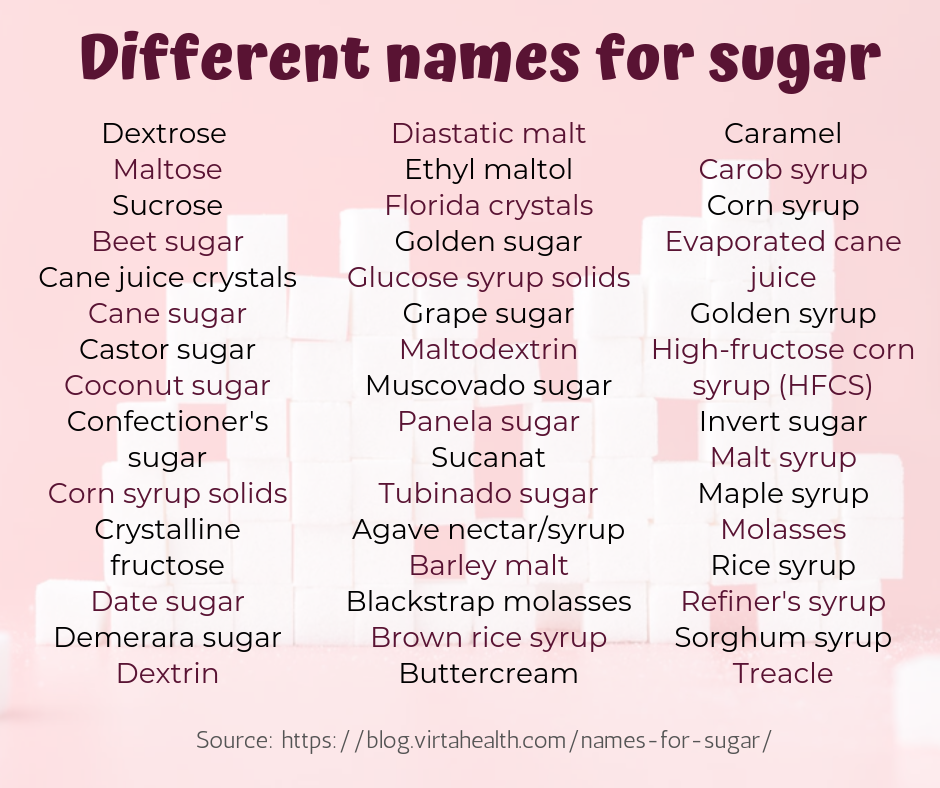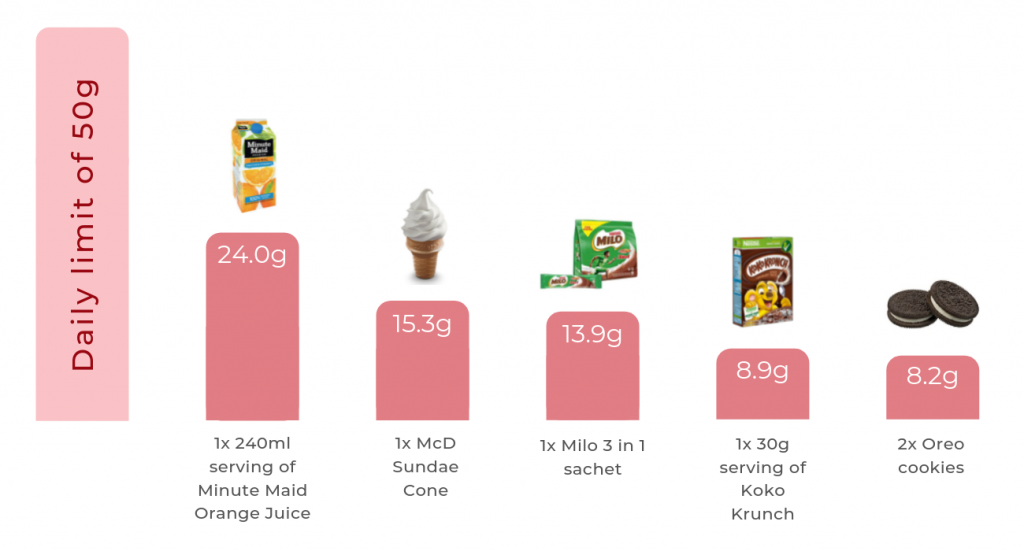With the bubble milk tea hype going on in town, it is nothing new for us being advised on choosing low sugar levels. But how much do you know about this white, sweet substance that is often demonised?
What is sugar?
Sugar is a class of carbohydrates that has a natural sweet taste. They are easily absorbed by our bodies to supply us with energy so that we can carry out our daily activities. Examples of sugars are glucose, fructose, sucrose and lactose.
Where can sugars be found?
Sugars are found in fruits, vegetables and milk. These naturally occuring sugars are known as intrinsic sugars.
Sugars are also commonly used as a food additive in the form of sucrose (table sugar) and many more so sweeten food products. These are known as free sugars.
World Health Organization (WHO) refer free sugars as ‘sugars added to foods by the manufacturer, cook, or consumer, plus sugars naturally present in honey, syrups and fruit juices’.
How much sugar can I consume per day?
For a person of healthy body weight consuming about 2000 calories per day, WHO recommends less than 10% of total energy intake from free sugars, which is equivalent to 50 g (about 12 level teaspoons). WHO also suggests that a further reduction to less than 5% may provide additional health benefits.
Do check out this list below if you want to identify ‘added sugar’ in the ingredients list!

50g may sound a lot, but you should be aware that most of the free sugars we consume daily are found in food products such as confectionery, desserts, sugar-sweetened beverages and many more. They are often associated with foods with high energy content but low nutrient density. These are called ’empty calories’.
Here’s the sugar content of some popular food products to give you an idea of the amount of sugars you’re consuming:

It is definitely worth monitoring your sugar intake by reading the ‘total sugars’ content in the nutrition facts label.
Why is excess sugar bad for me?

Sugars are the main cause of dental caries especially among children.
Excessive sugar intakes are often linked with unhealthy weight gain. When your calorie intake is greater than your calorie output, the excess calories from sugars will be stored as fat. Excessive accumulation of fat will lead to obesity. It is associated with increased health risks such as high blood pressure, type 2 diabetes and fatty liver.
A recent study published in the BMJ has also found that high sugar intakes are associated with an increased risk of overall cancer and breast cancer.
Why are sugars in fruits OK?
Do note that when you eat whole fruits, you are also consuming a significant amount of fibre. The sugars are usually bound in these fibrous structures that break down slowly during digestion.
Therefore, the sugar will be delivered to your liver slowly and in small amounts. This means that your liver can easily metabolize the sugar. In fact, we should eat fruits as a part of our daily diet.
Fruits are highly packed with nutrients and fibre that are essential for our health. However, do note that this does not apply to fruit juices, even fresh ones. The undesirably high free sugar content in fruit juices outweighs its other benefits.
Do I need to cut my sugar intake?
Of course, you don’t have to cut out all your sweet snacks as long as you’re not having too much in a day (>50g). Restricting yourself too much may even affect your mood or make you crave sugars more badly!
Does my genes play a role in sugar absorption?
The FABP2 and ADRB2 genes affect our carbohydrate sensitivity. If you have the variants that give you high sensitivity, carbohydrates take longer to be processed in your body. They will sustain higher insulin levels for a longer time. This makes you more susceptible to weight gain, as insulin encourage your body to convert sugar into fat.
It also increases your likelihood of insulin resistance and developing type 2 diabetes. Therefore, for individuals who have high carbohydrate sensitivity needs to be more aware of their sugar intake.
References
- World Health Organization. (2019). Healthy diet. [online] Available at: https://www.who.int/news-room/fact-sheets/detail/healthy-diet [Accessed 11 Jul. 2019].
- Chazelas, E. et al. (2019). Sugary drink consumption and risk of cancer: results from NutriNet-Santé prospective cohort. BMJ, p.l2408.
References on sugar content
- https://www.qoo10.my/item/NESTLE-MILO-3IN1-8X33G-STICK-POUCH/437495474?sellerview=on&__ar=Y
- https://www.nestle-cereals.com/ph/en/products-promotions/brands/koko-krunch-brand/koko-krunch-cereal
- https://www.mcdonalds.com.my/menu/sundae-cone
- https://www.coca-colaproductfacts.com/en/products/minute-maid-orange-juice/calcium-vitamin-d/59-oz/
- https://www.oreo.co.uk/products/original-oreo